The Akhil Bharatiya Pratinidhi Sabha of the Rashtriya Swayamsevak Sangh (RSS) was held in Gwalior from March 8 to 10. A total of 1,420 workers from various RSS associated organisations attended the meeting. RSS Sarkaryavah Shri Bhaiyaji Joshi called upon the Sangh karyakartas to have more contact with the various positive social initiatives and activities. The well-intentioned forces working in the national interest should succeed so that their impact grows. We should be confident that we shall be able to bring all these positive forces together. In today’s favourable conditions if we do hard work, then we will experience that we are moving ahead towards our goal. Let us do our work as worship. The period in which we experienced neglect and apathy is over. Let us resolve to move ahead with courage, imagination and enthusiasm
The Akhil Bharatiya Pratinidhi Sabha (ABPS) of the Rashtriya Swayamsevak Sangh (RSS) was held in Gwalior from March 8 to 10, 2019. It was for the first time that Gwalior hosted the ABPS, the apex policy making body of the RSS. The previous year’s ABPS was held in Nagpur. The annual meeting is held alternately in South, North and Nagpur to deliberate on the current national, social and religious scenario in the country.
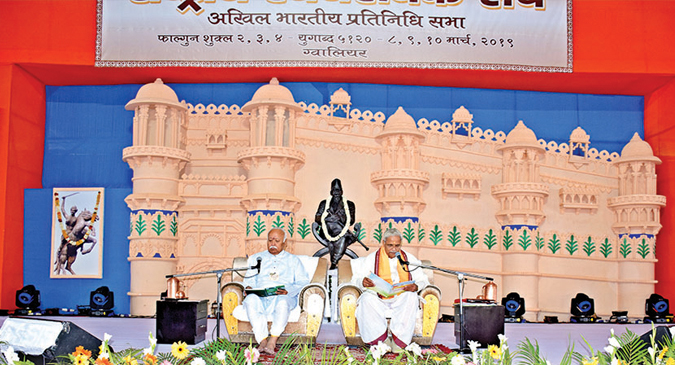
If Rajasthan’s Nagaur hosted the Pratinidhi Sabha in 2016, it was the turn of Coimbatore in 2017. Known as the cultural capital of Madhya Pradesh, the historic city of Gwalior is characterised by benevolent cultural richness, grand palaces and Hindu architectural marvels. Home to many great artists, poets, musicians and political figures, the lasting legacy of Gwalior personified in the taller figures, from Tansen to Vijaya Raje Scindia and Atal Behari Vajpayee, who left indelible imprints on the Indian minds.
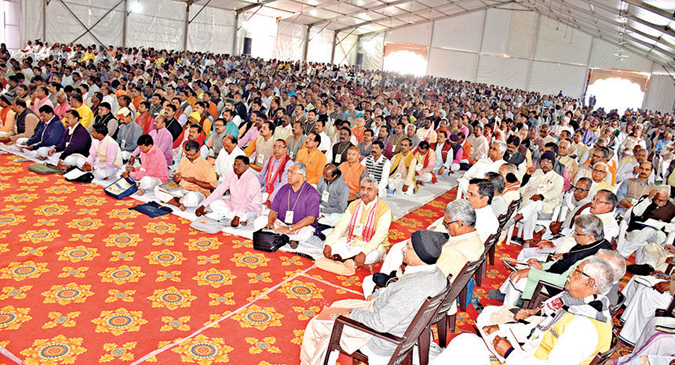
Delegates from across the country at the Pratinidhi Sabha in Gwalior
The Samadhi of Rani Lakshmibai, a pilgrimage centre for every nationalist, is situated at Phoolbag area, where she made the supreme sacrifice in 1858 while fighting against the British. The architectural wonders like Gwalior Fort and the marvels of Mitawali, Padavali and Bateshwar Temples are situated just a few kilometres away from the main city. This year, over 1,400 elected as well as invited representatives from all across the country came to this city, where the fervour of nationalism blends with the richness of culture. No wonder, the main hall where the deliberations for the three-days took place was named after Rani Laxmibai. The ambience and atmosphere of the Saraswati Shishu Mandir of Kedar Dham, where the Pratinidhi Sabha took place, was filled with the same cultural and nationalist zeal.
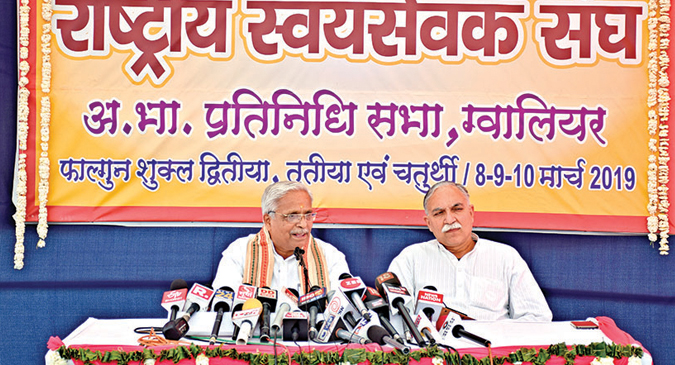
RSS Sarkaryavah Shri Bhaiyaji Joshi addressing the media persons in Gwalior
With Sarsanghchalak Shri Mohan Bhagwat and Sarkaryavah Shri Bhaiyaji Joshi paying floral tribute to Bharat Mata, the three-day meeting began on March 8. Office bearers and representatives from 43 Prant and 11 Kshetra attended the conclave. A total of 1,535 participants were expected to the Pratinidhi Sabha, out of which 92 per cent could make it with their own travel expenses and contribution for the three-day meet.
As per rules, the minutes of the previous Pratinidhi Sabha held at Nagpur was read out and subsequently approved unanimously. Then Sarkaryavah presented a comprehensive annual report taking stock of the entire year. In the beginning, he paid tribute to distinguished personalities from social, political, religious, and cultural fields who have travelled towards the final destination in the last year. The growth of Shakhas and numbers in various training programmes were also presented to the Sabha (see tables).
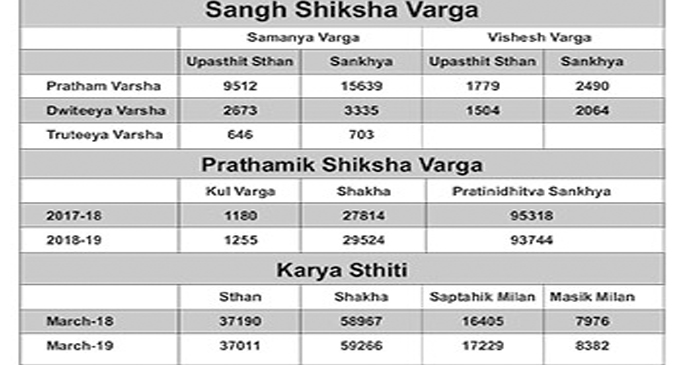
After presenting the special meetings and tours of the Sarsanghachalak & Sarkaryavah, achievements of the different Karya Vibhags, namely, Sharirik, Bouddhik, Sewa, Prachar and Samapark of last one year were elaborated. The activities of Gau-Sewa, Gram Vikas, Samarasata & Kutumba Prabodhan were also discussed in the report.
In the Prant-level special initiatives like Basti Sangamam of Chennai where special efforts to achieve the target of making all bastis Karyayukta (locality with the RSS work), Karyakarta Shibir of Karnataka Dakshin for development of karyakartas and expansion of work, Pravasi Karyakarta Shibir of Vidarbha, Samajik Mahayagya in Gujarat to spread the message of Samarasata, Vistarak campaign for rural work in Chittor, Bal Sangam of Delhi to spread the work among children, special efforts to strengthen social involvement and environment projects in Jammu & Kashmir through village committees, Ramnavami Shobha Yatra in Bengal, etc. found special mention.
Commenting on the national scenario, Shri Bhaiyaji Joshi said, “The Socio-political landscape of nation remains a mixture of some inspiring vents as well as some disquieting events which upset the social fabric. Sometimes the feelings of unrest, disappointment, apathy and anger dominate the social atmosphere. Efforts are needed at all levels to preserve the balance and to create an atmosphere of mutual trust amongst society”. He also said that Hindutva is neither secluded, rigid and nor uniform. Diversity, special modes of worship are our speciality. At the local level, festivities, customs and traditions are varied across the states from East to West and from North to South. For hundreds of years, the social life is flowing with such traditions and beliefs while making a reference to the Sabarimala movement.
On Shri Ram Janmabhoomi case, the Report says, “We are experiencing that Hindus are constantly being neglected. While having full respect in the judicial system, we would like to say emphatically that the Judgment on the dispute must expedite and remove the obstacles in constructing a grand Temple”.
The recently concluded Kumbh in Prayagraj also found special mention in the report for the peaceful, clean and disciplined gathering of pilgrims in huge numbers. On this occasion intellectual brainstorming sessions were also conducted by Uttar Pradesh Government in association with various social institutions on issues such as Samarasata, environment, youth and women issues and saints of various sects coming together in Kumbh to discuss the issue of ‘social inclusion’ was especially appreciated in the report.
Referring to the general elections, the Sarkaryavah said it is always expected that elections should be held in a healthy and congenial atmosphere. It is necessary that 100 per cent of voters exercise their constitutional right to cast a vote. The development of the nation and safeguarding its pride is possible only in the hands of a group, which is honest and committed to the national interest. Therefore, it is our national duty to be alert and to discharge our responsibility in the election process.
About Pulwama terrorist attack, the Sarkarayvah said that the external forces, with the help of some anti-national internal elements, are giving shape to violent incidents. The attacks on the camps of Army and defence forces, intrusive attacks in the border areas by Pakistan Army, the recent Pulwama attack, the resultant deaths of citizens and security personnel, all this is very tragic. Nobody should take our tolerance as a sign of our weakness. All social and political forces have displayed a spirit of unity at such times. Along with that, it is necessary that the Government should take stern action against anti-national forces and people should feel a sense of security. The present Government is taking praiseworthy efforts in this direction. It is necessary that along with the administration, the common people should also be vigilant. The religious and social institutions which are doing the social awakening should do so more effectively and actively. Even educational institutions can play an important role in social awakening along with educational activities, he added.
The Sangh karyakartas also should have more contact with the various positive social initiatives and activities. The well-intentioned forces working in the national interest should succeed so that their impact grows. We should be confident that we shall be able to bring all the positive forces together. In today’s favourable conditions if we do hard work, then we will experience that we are moving ahead towards our goal. Let us do our work as worship. The period in which we experienced neglect and apathy is over. Let us resolve to move ahead with courage, imagination and enthusiasm, the Sarkaryavah added.
Immediately after the inaugural session, addressing the media on the first day, RSS Sah Sarkaryavah Dr Manmohan Vaidya said, the Pratinidhi Sabha would debate two important resolutions on the need to protect tradition and beliefs and family system. On the first day, the ABPS passed a resolution on ‘Bharatiya Family System: A Unique Contribution to Humanity.
In the second session, various Sangh inspired organisations, around 35, presented their annual report in brief. The presentation was in various groups starting with the organisations working in the fileds of culture, economy, Sewa, Shiksha and Society.
On day two, another resolution was presented and deliberated upon on the ‘Need to Protect the Traditions and Beliefs of Hindu Society’ in the context of the Sabarimala issue. On second day, Sah-Sarkaryavah Shri Dattatreya Hosabale, in a press meet, said Sarkaryavah Shri Bhaiyaji Joshi stated during the meet that the 75th anniversary of the Azad Hind Fauz government should be celebrated all over the country.
A special bauddhik Shri Dattatreya Hosabale was organised on the core principles of the Sangh work. He described the RSS as an ‘open university for human resource development and human resource management’. He said, Be and Make is the core of Sangh philosophy that we should live with.
Speaking to media on the last day of the conclave, RSS Sarkaryavah Shri Bhaiyaji Joshi said that the three-day meeting reviewed various activities of the organisation and discussed contemporary issues. He said the RSS has decided to take up a new initiative in the field of environment protection and conservation. He said there would be a greater focus on ‘Samajik Samarasata’.
“The RSS’ work has reached a certain level, and now we feel that it is time to take a big leap in terms of expansion of the work,” said Shri Joshi. Elaborating the new initiative of RSS, he said the Sangh will take up various activities along with the society in the field of environment protection and conservation through initiatives in three key areas—water conservation and water management, planting trees and eliminating use of plastic and other non-biodegradable material like Thermocol.
Replying to a question, he said the RSS stand on Ram Temple is clear. It should be built at the place where it has been decided to be built. The movement on this issue will continue till the temple is constructed. On the issue of appointment of a mediation panel by the apex court, he said the RSS welcomes any initiative that can help resolve this issue to construct the Ram Temple. The RSS expects that the government and the Court would remove the barriers in the path of constructing the temple at the earliest. It is also expected from the mediation panel that they would understand the Hindu sentiment. Those in power are not opposed to the Ram Temple and there is no doubt over their commitment regarding this, said Shri Bhaiyaji Joshi.
Sarkaryavah appreciated the government’s response in terms of carrying out air strikes on terror camps in Pakistan in the wake of Pulwama terror attack. He said the fearless nations reply to the terrorists in a similar language.
Replying to another question on Article 370, he said the case related to Section 35A is in the Court. It is expected that the government of the day will keep the viewpoint firmly. After a decision on this case is delivered, the issue of Article 370 will be discussed in light of this decision. On the issue of Sangh’s role in elections, Shri Joshi said the RSS’ role is clear. We will work for creating awareness to ensure 100 per cent voting.
In the concluding remarks, Sarsanghachalak Shri Mohan Bhagwat guided the entire Sabha in which he cautioned about the dangers of creeping complacency with the growth of the organisation. If the basic texture and culture of the philosophy behind the Sangh is kept, we can deal with this issue. If we keep the ‘Mantra’ of the living the thought we preach in mind, the trantra (system) will not become yantra (machine). He gave a call to everyone to go back to the Karya Kshetra and work with new energy and vigour to attain new heights for the nation.



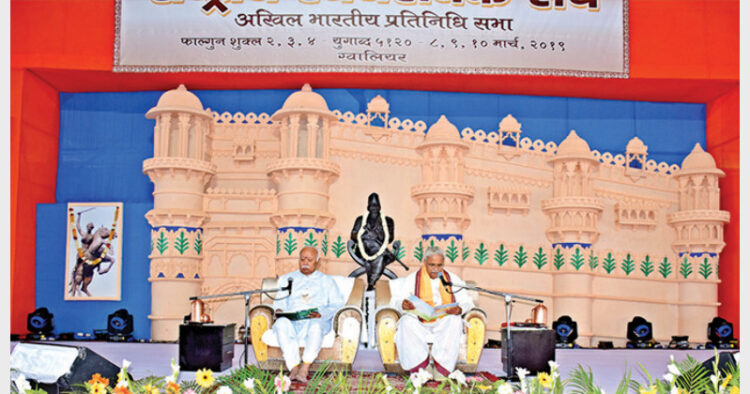










Comments